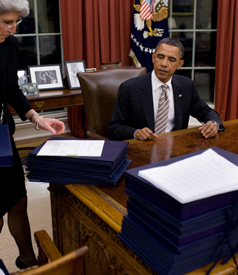Support justice-driven, accurate and transparent news — make a quick donation to Truthout today!
Washington — President Barack Obama on Friday reluctantly signed into law a military-funding bill that limits him from transferring terrorism detainees from Guantanamo Bay, Cuba, to the U.S. or foreign countries, but he signaled that he may get past the restrictions by using non-Pentagon resources to get the job done.
Even as he reserved that right, it wasn’t immediately clear to what degree the president still may capitulate to political pressure between now and his 2012 re-election campaign to keep detainees off U.S. soil and out of civilian courts.
The development also left uncertain what Attorney General Eric Holder would do about the trial of alleged mastermind Khalid Sheik Mohammed and four other Guantanamo captives who allegedly were the plotters, funders and trainers of the hijackers of four commercial aircraft on Sept. 11, 2001. Holder initially wanted to prosecute them in federal court in lower Manhattan, not far from Ground Zero, a choice that angered conservatives and some victims’ families.
In a harshly worded signing statement to Congress accompanying the National Defense Authorization Act, Obama said that the law’s limits on detainee transfers represent “a dangerous and unprecedented challenge to critical executive branch authority” and that any attempt to block the use of federal courts to try terrorists “undermines our nation’s counterterrorism efforts and has the potential to harm our national security.”
He similarly criticized a provision that would add new hurdles to using defense funds to transfer detainees to the custody of foreign countries. He said such certification requirements “would hinder the conduct of delicate negotiations with foreign countries and therefore the effort to conclude detainee transfers in accord with our national security.”
Obama said his team will “seek repeal of these restrictions, will seek to mitigate their effects, and will oppose any attempt to extend or expand them in the future.”
He didn’t say explicitly that he’ll look to use money or equipment from the State, Justice or Homeland Security departments to get around the new restrictions.
But Christopher Anders, the senior legislative counsel for the American Civil Liberties Union, said that’s what’s implied.
Anders said if the legislation had completely banned the transfer of detainees to the U.S. or foreign countries, it would have been unconstitutional, and Obama would have said so. Anders also noted that Obama’s statement discusses restrictions on the use of defense funds and calls them a challenge, but not a block on his authority.
“Really, what it comes down to is the administration is making a statement that although this makes life more difficult for them, they can still carry out transfers through other agencies,” Anders said.
“The big question that remains out there is: Is the president actually going to use that authority that he’s retaining here? That of course has been the frustration for the past two years.”
Obama had little choice but to sign H.R. 6523 because it releases money needed to keep the military funded as it winds down two wars.
Congress’ legislation is just the latest to confound the Obama administration ambition to empty the prison camp at Guantanamo, initially by Jan. 22, 2010 under an Executive Order the president had signed a year earlier, on his second day in office.
Obama’s move also comes a day after his administration released its first Guantanamo captive since mid-September.
Plans to bring detainees into the U.S. have met stiff resistance across the country. They’ve become a political liability for Obama and Democrats even as they argue that U.S. prisons are well able to secure the detainees and protect the public.
Obama’s move comes days before the Guantanamo prison, which opened on Jan. 11, 2002, with the first 20 captives, enters its 10th year.
As of Friday, the Pentagon had 173 captives from 24 nations confined in the sprawling Caribbean Sea front compound, only three of them convicted of war crimes. The other 600 captives once held at Guantanamo have been released, with one-fourth confirmed or suspected of engaging in terrorism or insurgent activities.
The White House declined to make any of its lawyers involved in the wording of the statement available for comment. An administration official released a statement on condition of anonymity that said that Obama “has made it clear that he’s going to follow the statute, and he’s made it clear — as have our military commanders — that closing Guantanamo is a national security imperative. We’re continuing to review the provisions in the bill.”
(Talev reported from Washington. Rosenberg reports for The Miami Herald from Miami.)
Media that fights fascism
Truthout is funded almost entirely by readers — that’s why we can speak truth to power and cut against the mainstream narrative. But independent journalists at Truthout face mounting political repression under Trump.
We rely on your support to survive McCarthyist censorship. Please make a tax-deductible one-time or monthly donation.
